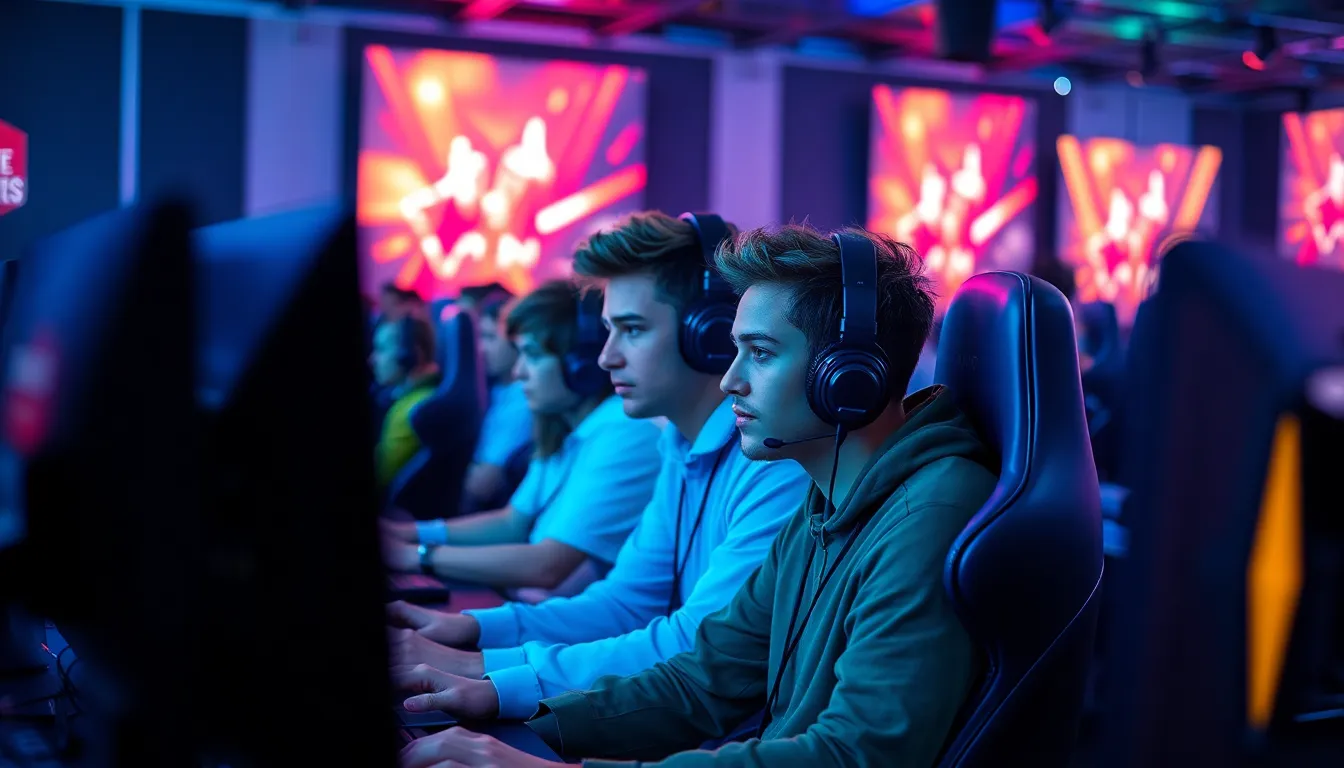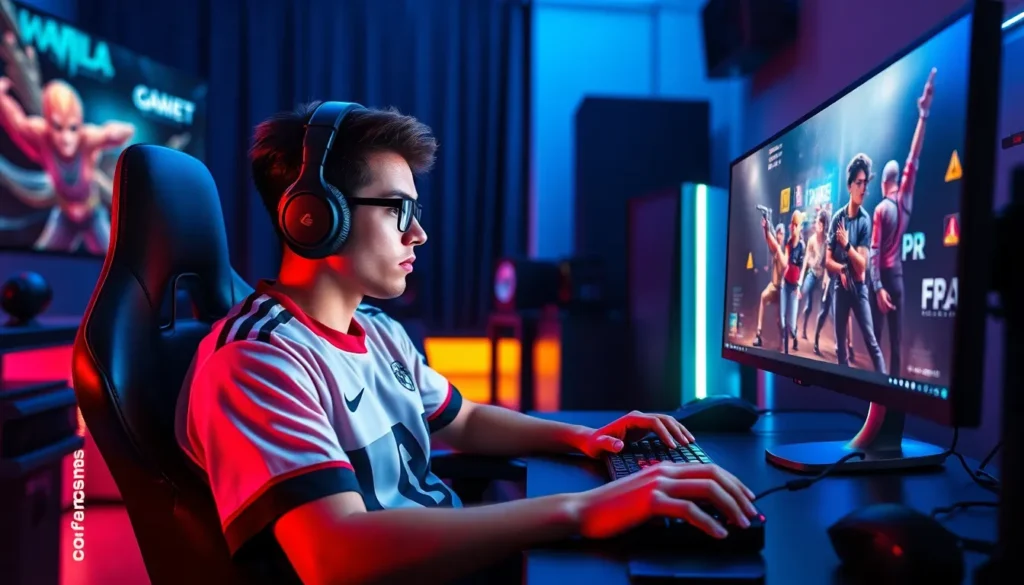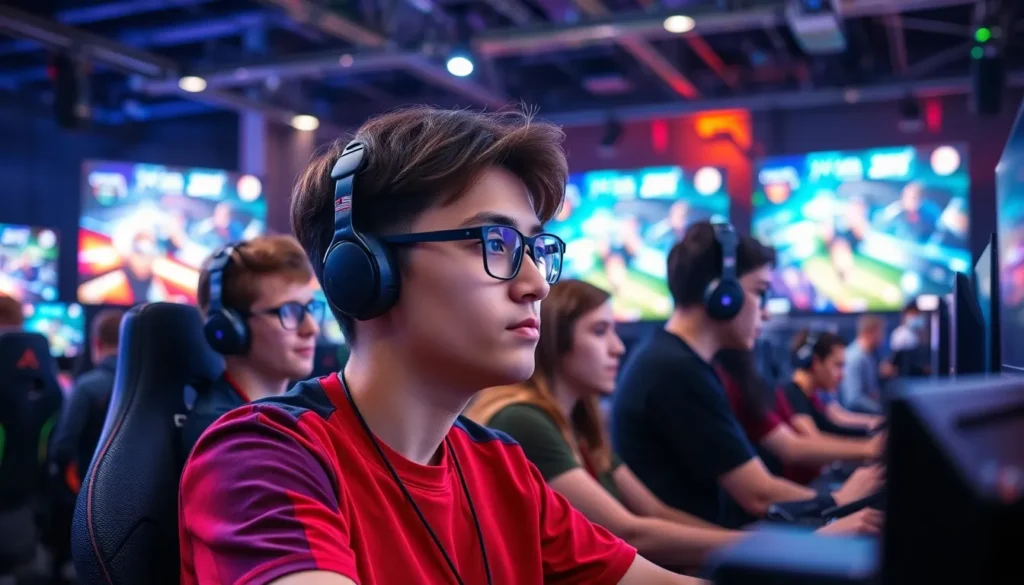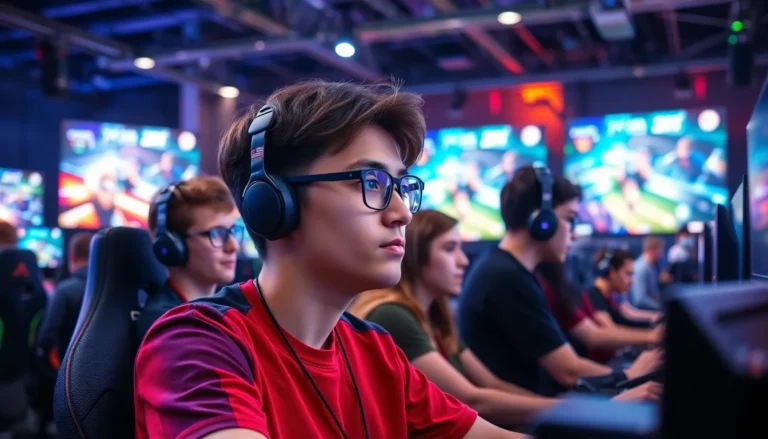Table of Contents
ToggleIn a world where athletes sweat it out on the field, another breed of competitors is racking up victories from the comfort of their gaming chairs. Esports has exploded into a global phenomenon, raising the question: are these digital gladiators truly athletes? With reflexes sharper than a ninja and strategies more intricate than a conspiracy theory, gamers are redefining what it means to be a sport.
Definition Of Esports
Esports refers to organized competitive gaming, where players compete in video games in a structured format. This competition can take place online or in-person at various venues. Genres of esports include first-person shooters, real-time strategy games, battle arenas, and sports simulations, among others.
Participants often demonstrate a high level of skill, knowledge, and strategy that parallels traditional sports. Players frequently engage in teamwork and individual competition, similar to athletes in physical sports. Events may be watched by millions of fans, and prize pools can reach into the millions of dollars.
Professional esports athletes spend significant time training and practicing to improve their skills. Training routines often include strategy discussions, practice matches, and physical conditioning to maintain focus and improve reflexes. Many agree that the dedication required in esports is comparable to that of traditional athletes.
Organizations and teams exist that support players throughout their careers. Sponsorships, merchandise, and endorsements contribute significantly to the growth of esports. Market analysis shows that the global esports audience is expected to surpass 600 million by 2025.
In many countries, esports are recognized as legitimate sports, allowing participants to obtain visas and scholarships similar to traditional athletes. This acknowledgment helps solidify esports’ status within the broader sports culture. The question remains whether the community will fully embrace esports in the same light as traditional sports.
Historical Context

The growth of esports traces back to the late 20th century, marking a significant shift in how competitive gaming is perceived and organized.
Origins Of Competitive Gaming
Competitive gaming emerged in the 1970s with arcade games like “Pong,” where players would compete for high scores. Tournaments became a focal point as early as 1980, with the “Space Invaders Championship” attracting thousands of participants. This event showcased the potential of gaming as a form of competition. By the mid-1990s, LAN parties and online matchmaking sites facilitated multiplayer games. The introduction of titles like “Quake” in 1996 established a foundation for serious competition. Gamers began forming teams and honing their skills more intensely.
Evolution Of Esports Industry
The late 1990s and early 2000s marked the evolution of the esports industry, driven by advances in technology. Online streaming platforms emerged, expanding the reach of competitive gaming events to global audiences. Major tournaments, such as the Electronic Sports World Cup, began to take shape, fostering a sense of community among gamers. Growth accelerated in the 2010s with significant investments from traditional sports organizations and brands. In 2021, revenue from esports surpassed $1 billion, driven by sponsorships, merchandise, and media rights. The industry’s rapid growth solidified esports as a legitimate contender within the global sports landscape.
Comparison With Traditional Sports
Esports increasingly draws comparisons to traditional sports, emphasizing skills and strategies shared between the two realms.
Skill And Strategy
Competitors in esports demonstrate extensive skills and refined strategies. Quick reflexes and strategic thinking are essential for success in games like “League of Legends” and “Counter-Strike.” Teamwork develops through practice and communication, mirroring the dynamics of traditional sports teams. Players analyze opponents’ moves, adjusting tactics in real time to secure victories. Professional gamers invest hours refining their skills, demonstrating dedication comparable to athletes in physical sports.
Physicality And Fitness
While esports lacks traditional physical demands, fitness still plays a critical role. Success in competitive gaming requires endurance, focus, and mental agility. Many professional gamers engage in physical training to enhance stamina and cognitive function. A study published in the “Journal of Sports Medicine” highlights that physical fitness contributes to reaction time and decision-making abilities. Their training regimens, which include physical conditioning, underscore the importance of wellness in maintaining competitive edge.
Arguments For Esports As Sports
Esports demonstrate characteristics that align them with traditional sports. These aspects include recognition from sports organizations and the impact on mental agility.
Recognition By Sports Organizations
Several sports organizations officially recognize esports as a legitimate sport. The International Olympic Committee (IOC) has expressed interest in including esports in future Olympic events. Various national sports bodies, such as the European Esports Federation, endorse competitive gaming. These organizations often provide athletes with the same benefits awarded to traditional sports competitors, including scholarships and training support. Countries like South Korea and China allow professional gamers to secure visas for competitions, furthering their status as athletes. Acknowledgment from recognized entities solidifies esports as a serious player in global sports landscapes.
Impact On Mental Agility
Esports require intense mental focus and quick decision-making, emphasizing the cognitive side of competition. Gamers regularly practice to enhance reaction times, strategic thinking, and multitasking skills. Studies reveal that participation in esports can lead to improved mental processes and greater attention spans. High-level players adapt quickly to unpredictable scenarios, demonstrating a level of cognitive flexibility akin to traditional sports. Endurance in maintaining focus during lengthy matches becomes crucial, directly affecting performance outcomes. Thus, mental agility remains a foundational element of success in competitive gaming, paralleling the requirements seen in physical sports.
Arguments Against Esports As Sports
Concerns exist regarding the classification of esports as legitimate sports due to several factors.
Physical Activity Concerns
Critics argue esports lack the physical activity typical in traditional sports. The primary focus lies on mental skill rather than physical endurance. Participants engage in hours of gameplay while sitting, which some view as unrepresentative of athleticism. Traditional sports emphasize physical exertion, where athletes train rigorously using their bodies. In contrast, the sedentary nature of gaming raises doubts about its classification. While esports require quick reflexes, critics highlight that these skills don’t equate to physical conditioning seen in conventional sports disciplines.
Perception In Society
Societal perceptions of esports further complicate their status as sports. Many individuals associate athleticism with physical challenges and outdoor activities. The image of video gamers often includes stereotypes that don’t align with traditional athletes. Additionally, mainstream media coverage tends to favor physical sports, leading to underrepresentation of esports. Many traditional sports fans resist accepting competitive gaming within their realm, creating a divide in recognition. This disparity in societal acceptance influences how esports athletes are viewed, fostering an ongoing debate on their legitimacy in the sports arena.
Esports have undeniably carved out a significant niche within the global sports landscape. The skills and dedication exhibited by competitive gamers parallel those of traditional athletes, challenging conventional definitions of sports. As recognition grows from organizations and audiences alike, esports continue to gain legitimacy, attracting sponsorships and fostering community engagement.
While debates about their classification persist, the evolution of esports reflects changing perceptions of competition and athleticism. The future looks promising as more people embrace esports, blurring the lines between digital and physical sports. With an expanding audience and increasing institutional support, esports are poised to secure their place in the broader sports culture.







